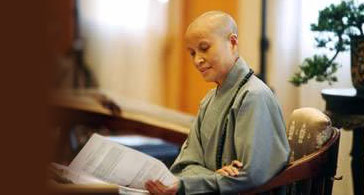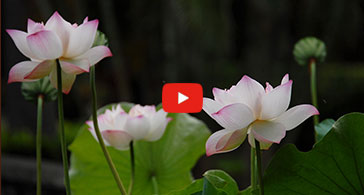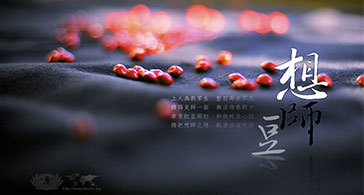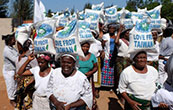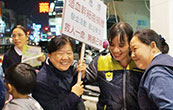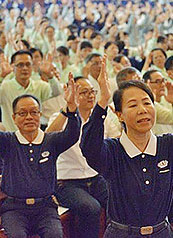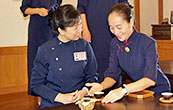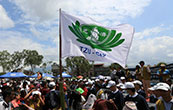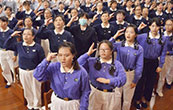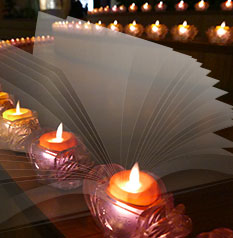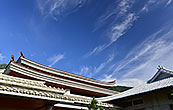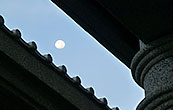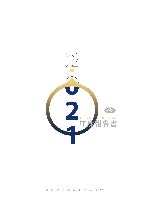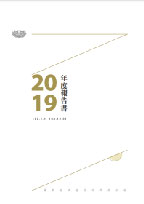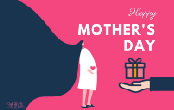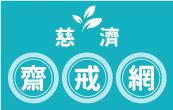慈濟宗門的人文精神與思想略說(下)
2007-05-06 | 何日生
The Spirit and Philosophy of Tzu Chi Movement
從證嚴上人之思想對當今世界的啟示談起
The Concise for Dharma Master Cheng Yen’s
Philosophy and Her Inspiration
to the Modern World
發表于:日本京都庭野和平獎研討會
Kyoto, Japan Niwano Peace Foundation
慈濟思想與西方的自由主義
Tzu Chi Thought and Western Liberalism
慈濟以團隊行善,強調團體合心協力之重要性,其本質是植基於東方精神。這給予信奉西方自由主義及個人主義之人們,在面臨價值虛無及空洞之際,產生很大的啟示。慈濟人認為個人其實是在群體中才能得到自由,一如上人所言,「一滴水能夠不乾涸,是因為投入廣大的江河大海。」
Tzu Chi practices good works as a team, stressing the importance of joining hearts and hands to work together as group, an attitude that is firmly rooted in the spirit of the East. This can provide much inspiration for those who believe in the liberalism and individualism of the West who are faced with empty values and meaninglessness. Tzu Chi members think that the individual can only find liberation as a part of a group. As the Master says, "A drop of water can avoid drying up by jumping into the great waters of the river or the sea."
慈濟人見證群體無私付出之能量,在世界六十一個國家發展慈善及醫療等四大志業,證實群體協力之成果。在群體中,個人之能量,反而因為無私、因為大家的相互成就,而且能力及性格都得到更大之成長及發揮。在慈濟制服背後所彰顯的是一個平等的心,而制服外觀所凸顯的是愛心的符碼,是人性利他的最榮譽和象徵。
Tzu Chi members demonstrate the energy produced by collective selflessness. The achievements of group effort have been proven in 61 countries around the world where the Four Missions, which include charity and medical care, have been developed. The energy of an individual’s ability and personality receives greater growth and fulfilment within a group due to selflessness and mutual achievement. Behind a Tzu Chi uniform beats a heart striving for equality, and the symbol of love, prominent on the outside of the uniform, is the most honoured symbol of an altruistic nature.
但是文明的許多發展卻把我們推出那個巨大的集體能量。現代文明教導我們——「人」的根本是自己、是自我;但自我竟是孤寂的起點。聖經所言,當亞當夏娃吃了禁果,開始認識自己之後,他們開始分別了你、我,分別自己、他人和自然萬物是不相同的;這種認識竟是自我孤寂的開始,也是原罪的肇因。
However, many of the developments of civilization push us away from that vast collective energy. Modern civilization teaches us that the root of man is the self. But the self is an isolated starting point. The Bible says that when Adam and Eve ate the forbidden fruit, they started to understand themselves, they started to differentiate between you and me, and they saw that self and others and all things in the world that are separated. This knowledge is the beginning of the isolated self and the source of original sin.
在歷史的進程中,我們不斷地背道而馳,將自己與一切整體之能量分離。當人類發明文字,就與萬物的實體分離;當我們發展了科學,就脫離了使人們渾然一體的宗教;當我們發展工業,就脫離了家庭;當我們發明了電視,就脫離了學校;當我們擺脫了貧窮,我們也脫離了一切權威所加諸的束縛。
In the progress of history, we have constantly run in the wrong direction, separating the self from the energy of the whole. When man invented writing, he was separated from the substance of all things. When we developed science, we got away from the religion that made people a coherent whole. When we developed industry, we moved away from the family. When we invented television we broke away from the schools. When we got rid of the simple lifestyle, we also got rid of all the limits imposed by respect for authority.
聽過金錢使人自由嗎?金錢畢竟沒有使多少人的內心真正獲得自由。終於,聰明的人類逐漸找到一個屬於個人的獨立的價值觀,獨特的專長和特立的人格。但就在個人化逐漸成形之際,人們卻發現最後他必須孓然一身,面對一個充滿孤獨、茫然又危險不安的世界。
Have you ever heard that money will set you free? In the end, money has never made anybody truly free in their hearts. Finally, an intelligent man gradually finds an independent set of values, unique skills, and an original personality that belong to him alone. But in the gradual process of becoming an individual, people discover that finally, they have to face a world full of loneliness, confusion, and insecurity all by themselves.
不止於此,在強調個人主義的當代,人們用盡各種方式逃離自我;渴望在無止盡的情慾追逐中,透過彼此身心的水乳交融放棄自我,極欲在酒的迷醉中拋掉自我,沈湎在吸毒的狂亂顛倒中脫離自我,甚或埋首工作的匆忙中忘記自我。
And it doesn't stop there. In today's world, with the emphasis on individualism, people use all kinds of ways to seek escape from the self. In the endless pursuit of desire, they abandon the self in the intense attraction of each other’s bodies and minds, they throw away the self in the intoxication of drink, they escape the self in the confusion of drugs, and they even forget the self in the urgency of hard work.
即使中規中矩的你會說:我沒有藉由這些放縱物來逃避自我。但是當我們翻開報紙,轉開電視,就開始和群體社會相連結;當我們拿起信用卡,因著電視廣告所推介的商品而進行消費時,我們就不再是一個特立的自我及個體。一切都在群體約制中形朔著「我」。沒有人能以一個孤獨的個體存在這個世界。
Even if you say in your propriety, "I don't try to escape myself through these indulgences," but when we open the newspaper or turn on the television, we start to link up with the mass of society. When we pick up a credit card, and make a purchase because of a television commercial that introduced a product, we are no longer a unique self and individual. Everything creates "me" in the confines of the collective. No one can exist in this world as an isolated individual.
而弔詭的是,在自由主義的旗幟下,個人一方面以自我之實現及自由作為最終的價值。極力宣稱擁有自我及獨立個體。但是一方面,人們又用盡各種方式在逃避自我和孤離的窘境。而在追逐自我個體發展失敗之後,當代人們嘗試著用一種散亂的、無秩序的、瑣碎的集體氛圍,取代過去秩序謹然、價值縝密、群我和諧的團體模式。
And yet there is a paradox. Under the banner of individualism, the greatest value is the realization of the self and freedom, with every effort given to the promotion of owning the self as an independent individual. However, people have used up all kinds of ways to escape the self and this isolated predicament. And after failing in the search for an individual self, modern people try to use a kind of confused, disordered, and frivolous group atmosphere to replace the group pattern of careful order, deliberate values, and harmony between self and group that existed in the past.
在工業革命及理性主義發展之前,人類還是屬於群體社會的,在西方中世紀人士屬於教會及家庭的。在十八世紀以前的中國,個人很難想像離開宗族的自己到底是誰?即使是李白這種浪蕩不羈的才子也要說「與君歌一曲,請君為我傾耳聽」,酒不是一個人獨飲的,是和朋友、詩及大自然相通連的。所以李白最後才會說,「與爾同消萬古愁」,這麼愁,還是和朋友一起消愁,李白再愁也要和朋友一起消愁。因為那時候的人不被視為是「個體」;個體和群體是不可切割的。
Before the Industrial Revolution and the development of rationalism, people were still a part of the mass of society. In the West, a person of the Middle Ages belonged to the church and to the family. In China before the eighteenth century, it must have been hard to imagine such a thing as the individual outside of the family clan. Even a wandering poet like Li Bai had to say, "Let me sing you a song! Let your ears attend!" A man can't drink wine alone, since it's all connected with friends, poetry, and nature. That's why Li Bai said in the end, "And we'll drown away the woes of ten thousand generations!" Notice those woes are drowned away in the company of his friends. When Li Bai feels those woes again, he will still drown them away with his friends. That's because people of those times did not see themselves as individuals. The individual and the group could not be separated.
舊約聖經說,「父親吃了酸葡萄,連兒子的牙齒也酸壞了。」父親的行為會連帶影響孩子,換句話說,個體不存在,個人屬於家庭。而在中世紀的西方人很難想像,一個沒有上帝的世界以及一個沒有教會的社會將是什麼模樣?且聽猶太教的牧師(Rabbi )是怎麼說:「把鄰居當作自己來愛他們,因為所有的靈魂都是一體的。每一個人都是原初靈魂的一個火花,而且所有的靈魂天生就具足這個靈魂。」
The Old Testament of the Bible says, "The father eats the sour grapes, and the teeth of the children are set on edge." The actions of the father will influence the children, another way of saying that the individual does not exist since it is part of the family. Western people in the Middle Ages must have found it hard to imagine what a world without God or a society without the church would look like. As the Rabbi said, "Love your neighbour as yourself because all spirits are one. Everyone has a divine spark from the original divinity, and all spirits are naturally rooted in this divinity."
在東方,兩千四百年前印度太子悉達多在菩提樹下修行,有一天他夜睹明星而開悟在繁星點綴的星空中,他澈悟了宇宙的究竟之法。佛陀覺悟到,萬物原本都是一體的,一切都在不可思議的因緣中分離著,同時又契合著。
In the East, on a day about 2,400 years ago, an Indian prince named Siddhārtha sat under the bodhi-tree under the starry sky and completely understood the ultimate law of the cosmos. The Buddha woke up to the fact that all things are originally the same substance, and though everything is separated by unknowable causes, everything is still in harmony at the same time.
東西方的古老智慧不斷告訴我們,個體和群體之不可分割及相互依存之道。西方心理學家容格也說,每一個人如果要獲得生命的完整,或要取得更巨大的能量,就得讓心識通向集體潛意識。
The ancient wisdom of the East and the West constantly teaches us the lesson of the inseparability and the interdependence of the individual and the group. The psychologist Jung said that for everyone to possess a complete life or to acquire an even greater energy, they ultimately must let their mind be immersed in the collective unconscious.
當一個慈濟的醫師在台上和志工、護理同仁、甚或病患一起比手語,和著美麗的樂章表演出生命的感動,我們知道他是重回到群體懷裡,那是個體融合進大我之美。
When a Tzu Chi doctor is on the stage speaking in sign language with volunteers, nurses, or patients, it is a beautiful movement expressing the emotion of life, and we know he is returning back to within the group. That is the beauty of an individual fusing into the greater self.
當一群慈濟人在災區或環保場一起虔誠祈禱,我們說他是沈浸在大我的愉悅及虔敬中。
When a group of Tzu chi members piously prays in a disaster area or an environmental protection zone, we say they are immersed in the joy and piety of the greater self.
當慈濟人穿著整齊的制服出國賑災、親手膚慰感恩戶,同體對方的悲,理解對方的苦,我們說這是回歸到一個大愛的能量磁場裡,而那個大愛原本就在他的心裡;那是一種無私的給予,一種空,正如每一個珠子裡的那個空,能讓線穿過,能將大家都串成一起,編織成一個「大愛」廣闊的網,環繞宇宙一切有情眾生。
When Tzu Chi members put on the complete uniform and go abroad for disaster aid, personally consoling aid recipients, empathizing with their tragedy, and understanding their suffering, we say that this is returning to a magnetic field full of the energy of universal love. That universal love has always been inside the heart. That is a kind of selfless giving, a kind of emptiness. Just like the space inside every pearl can cause the rays of light to shine through, it can connect everyone together, weaving a vast web of love surrounding all sentient beings in the universe.
這是上人所創造及允諾的大我群體之美,也是個人通向自由及覺悟自在解脫之道。
This is the beauty of the great collective self created and promised by the Master. It is the way of liberation for the individual to move towards freedom and enlightenment.
西方的自由是來自社會及政治制度之保障,他的自由是外在的。但是佛教的自由卻是「定」,定亦即不被慾望捆綁的自由。佛較之所以強調「定」,而很少用「自由」這個字義,是因為真正的自由是來自內心。只有內心不再被慾望、執著、恐懼及妄想所佔據,人才真正自由,以佛教的言語來說,即是解脫。但是這項自由以慈濟意義來說,是在群體的愛中求得的。愛,是個人自由的核心。無論就環境或個人內心都是如此。
The freedom of the West is supported by society and a political system. It is an external freedom. But the freedom of Buddhism is rest, and not the freedom that is hindered by desires. Buddhism emphasizes "rest" and rarely uses the word "free" because true freedom comes from the inner mind. Only when the mind is no longer occupied by desires, anxieties, fears, and delusions can man be truly free, and in the words of Buddhism, find liberation. But this freedom, according to Tzu Chi, is found in the love of the group. Love is the core of a person's freedom. No matter how the environment changes, this is how it is in a person's inner mind.
上人強調內心的自在,亦即自由,是因為愛。環境中有愛,個人便會處得很自在;個人心中有愛,他的生命就很自由喜悅。當代佛教思想泰斗印順導師,生命最後的歲月是在慈濟度過。他生病期間住在慈濟醫院,老人家醒來就是微笑,一方面是他的修行工夫到家,內心禪寂,但是另一方面上人也強調,醫院裡的醫師,護士,其所有慈濟人營造一種愛的環境,讓導師住得很安心。可見上人認為個人獲致自由是環境的營造;內心能夠靜定,環境是一個因素,而且環境中「愛」的塑造,也是不可或缺。
The Master stresses that the peace of the inner mind as well as freedom is due to love. If there is love in the environment, the individual will carry on with peace. The last months of the life of the modern Buddhist thinker, Teacher Yinshun, were spent at Tzu Chi. When he was ill and staying at Tzu Chi Hospital, he awoke each morning with a smile. The Teacher's peaceful stay was partly due to his faithful practice and inner peace, but as the Master stresses, it was also partly due to the environment of love created by the doctors, nurses, and Tzu Chi members in the hospital. This shows the importance the Master places on the creation of an environment which leads to individual freedom. Environment plays a big part if the inner mind is to be at rest, and the creation of "love" in the environment is crucial.
因此,上人並不完全從內心修定做為人唯一達到內心禪寂、常在三昧的唯一途徑,環境的改造及作用仍是必要關鍵。這就是為什麼上人希望弟子能入世利他、無所求的去愛人;不只讓自我心中得到自在,也讓他人得到自在的原因。「其苦既拔已,復為說法」。環境與身體的苦先拔除,再給予法髓,使他獲致最終內在本性的定靜及智慧,即是通向內在自由光明的究竟之道。
Therefore the Master does not see the cultivation of the inner mind as the only path to reaching inner peace and constant meditation. The key is the rebuilding of the environment and its effect. This is why the Master hopes disciples can go out into the world and work for others, to love others unconditionally, and to help others find peace. After the suffering has been aided, then teach the dharma. First remove the suffering from the environment's body, and then impart the dharma essence, helping others receive the ultimate inner peace and wisdom that leads to the bright ultimate path of inner freedom.
慈濟理念對資本主義的反思
The philosophy of Tzu-Chi and the reflection of Capitalism
西方哲人培根從十六世紀當科學主義尚未到來之際,就預言科學世界的無遠弗屆將會根本改變人類。而十七世紀牛頓發現萬有引力之今,三百年來,世界的人口從1680年的四億人,至今到達六十多億。一個多世紀地球人口成長十六倍。(費爾南‧布勞岱爾,1999)人類在科學昌明之後,所耗費的資源比起之前的人類總消費要多上數億萬倍以上。
Prior to the advent of the scientism, Francis Bacon, a Western philosopher, predicted in the sixteenth century that the infinity in scientific world would have fundamentally changed human beings. In the 17th century, since Newton have discovered the universal gravitation till now, human population have increased within three-hundred years from four hundred millions in 1680 to sixth hundred millions today, in other words, the populace on the Earth has grown sixteen times within one century (Fernand Braudel, 1999). After the scientific flourishing, human being consuming resources has increased ten-thousand times as much as the total consumption before.
特別是資本主義社會鼓勵消費,人們非辛苦勤奮功用,從薪資、股票權、金融投資市場努力賺取大筆金錢,然後一轉頭就拼命消費。發展,成為資本社會唯一的價值及信念,但是其最終結局是讓人落入工作消費無止盡循環中不得出離。一方面地球能源無止盡的浩劫,大自然無止盡的遭破壞,已然成為當今人類繼續生存最大的危機。資本主義以利潤及消費做為基本生命之模式,已面臨嚴峻之挑戰。
The capitalism encouraged people to consuming desperately after they are working so hard to earn as much as possible the money from salary, stock, and financial markets. Development has become a sole value and belief in capital society, but the final ending, instead, makes people drop into an endless cycle of working and consuming. The maximum crisis to threaten human survival is the havoc caused by limitless sabotage on global energy resource, and the capitalism taking the profit and consumption as its basic mode of life has faced a stern challenge.
2006年12月,世界環境組織在巴黎召開會議,針對全球氣候暖化做出結論,一百多位科學家們一致認為,地球熱壞是人為因素所導致。人類過度的消費,無止盡的擴大生存面積,所造成對的自然之破壞及所製造之大氣層二氧化碳含量,已經使人類之生存面臨重大的危機。格陵蘭北極冰層之快速消失,意味著地球許多的低地將迅速被海水淹沒;美國紐奧良的洪水悲劇只是《明天過後》電影中預警的前奏曲。
On Dec. 2006, the World Environmental Organization (WEO) convened a conference at Paris, aiming at global warming weather to produce a conclusion. More than one hundred scientists unanimously assumed that the Earth being overheated is resulted from man-made factors. Human’s excessive consumption and unending expansion of surviving area has caused a serious damage to the Nature, and the carbon dioxide accumulated in the atmosphere also forced the human to face a critical crisis. The ice layer in Greenland rapidly disappeared symbolizes that many low lands on the Earth would be fast submerged by seawater while the flood over New Orleans is no more than a prelude of the movie “The Day After Tomorrow”.
其實證嚴上人早年在講述《法華經》時就說,天災始於人禍。而當今世界環境保護組織的結論中,證嚴上人的憂心及洞見似乎得到科學的見證及註解。
In fact, as Master Cheng-Yen interpreted “Lotus Sutra” (Saddharmapundarika Sutra) in the early year, she said, “The natural disaster begins from human being”. In the conclusion of the World Environmental Protection Organization today, Master’s anxiety and insight appears to have obtained the scientific witness and annotation.
天災從何而來?從人心之貪、瞋、癡等念頭而來!人心各種毒念自古有之,為何於今尤烈?無疑的科學的技術提升使人們的慾念更能得到擴大及滿足。藉著科技的進步,人們得以集體屠殺牛隻;許多豬隻終其一生都被關在一個僅能容身的鐵籠裡,甚至一生都沒有機會站起來過;商人用抗生素刺激雞快速生長,以便早日成為炸雞店裡的美食佳餚……。
Where the natural disaster comes from? It comes from human’s greed, anger, and infatuation. Evil idea has long existed in human’s heart from time immemorial, but why it becomes so furious today? Undoubtedly, it is the scientific promotion that prompts the expanding human desire able to be satisfied. Human beings can slaughter cattle collectively by high-tech progressive; a lot of pigs are all life locked in the iron cage barely accommodated their bodies, some of them even have no chance to stand up all their life, and the merchandisers use antibiotics to stimulate chickens to rapidly grow, so as to fast become a delicacy in the fried-chicken stores.
人類的生存竟是用數以億萬的生命作為代價!但其結果隨著森林消失,各種新興病毒如伊波拉、愛滋病毒等快速進入人群。隨著牛隻的數億的成長,也使得助長溫室效應的甲浣不斷增加。溫室效應的擴大,使得氣候逐漸起了激烈的變化,並快速威脅著人類整體的生存。
Human’s existence should be at the cost of billions of life, yet the consequence of which is the disappearance of forest and the emerging virus such as Ebola and AIDS that enter the throng. Following the cattle growth, the methane is also increasing the greenhouse effect, the enlargement of which makes the weather gradually occur with an intense variation and rapidly threaten all human existence.
社會的結構使人心的貪念更能擴大。現代社會的兩大結構「科學主義及資本主義」加速人心的貪念得以滋長蔓生,並且最終威脅到自己的生存。
Social structure enlarges human’s greedy heart, and the two major structures---Scientism and Capitalism---in modern society accelerate its growth that would ultimately menace to our own living.
催生資本主義的大師——亞當史密斯,在《國富論》裡面最早提到追逐自我利益與公共利益的關係。亞當史密斯認為追求公益其實必須來自私利的極大化,他以一位善於做弓箭之獵人為例,初期這位巧手之獵人做弓箭是為了興趣,他因為善於這項工藝漸漸的被獵人族群欣賞肯定,雖然偶爾他也會作一些弓箭送獵人朋友,獵人朋友答謝他也會回贈一些肉品。漸漸的這一位善於工匠的獵人,發覺他製作弓箭所得到的肉品比自己打獵要來得多並且容易。於是他就專心地變成弓箭製造的工匠,亞當史密斯說,社會的分工就從此開始。(Adam Smith 1789)
Adam Smith, the Master to hasten the delivery of capitalism, mentioned the relationship between self-profit and public welfare in his book, “The Wealth of Nations”. He assumed that seeking the public welfare actually has to originate from the maximum of self-profit. He exemplified the hunter who was good at manufacture of bow and arrow; in the very beginning, this skilful hunter produced it simply for fun, but when his workmanship has been appreciated and affirmed by other hunter groups, he would occasionally present some bow and arrow to his hunter friends, then, those friends would reciprocate him some bush meat. Bit by bit, the hunter discovered that the meat acquired by the bow and arrow he produced was much easier than the meat he hunted, so he became an artisan to produce intently the bow and arrow. Adam Smith said, “This is the onset of the social division of labour” (Adam Smith, 1789).
亞當史密斯作為資本主義的理論先驅,他的理論諭示著資本主義的「分工」,意味著每一個人各盡所能,終究會得到自己及社會整體最大的利益;追求自己利益之完成,同時也會利益人群。這是影響資本主義結構極深的《國富論》一書中最基本的看法,亦即公眾利益是來自私利的極大化;私利的明智運用不但造福自己也同時利益眾人。但其實資本主義的環境底下,私利極大化的發展並不必然造成公共利益的產生。
As a pioneer of capitalism theory, Adam Smith prophesied, “’Division of Labour’ of the capitalism signifies that every one shall do his best, and he will obtain the maximum benefits for himself and the whole society. Seeking to achieve his own profits will benefit the crowd at the same time”. This is the basic viewpoint listed in the book of “The Wealth of Nations” that affects the capitalism structure the most. For the public welfare is resulted from the maximum of private benefits; exercising the private benefit wisely is not only benefiting individuals, but also benefiting the public, but under the environment of capitalism, in fact, the maximum of private benefit is not necessarily producing the public welfare.
其實兩百年來,資本主義標榜的私利極大化所造成的結果,不只是公共利益未如亞當史密斯所預言的出現,反而造成世界貧富極度懸殊,生態環境前所未有之破壞。根據聯合國統計,全球有二十億人口活在貧窮邊緣,全世界百分之七十的資產是掌握在百分之二的人之手中。每四秒鐘就有一位孩童因為飢餓而死亡。我們身處之世界比起亞當史密斯的十八世紀之社會更不公平,財富也更不平均。
Within recent two hundred years, as it is, the maximum of private benefit praised by capitalism did not caused the public welfare as Smith’s prophecy, instead, cause an extreme poverty gap in the world while the ecological environment was unprecedented being sabotaged. According to UN’s statistic, total 2 billion populations on the Earth were living on the brink of poverty, and 70% of the global assets were held in the hands of those who account for 2% of the global populace. We are living in a world where every four seconds a child would die of hunger, which is more unfair than the 18th century world Adam Smith lived, much less the wealth.
資本主義社會受到達爾文主義之影響,物競天擇、鼓勵競爭。認為競爭是創造好產品及最有利於消費者的制度,在資本主義橫掃千軍之際,我們一方面要拼命工作,一方面拼命消費。如此循環周折、耗盡心力。我們信奉的科學,引導人們放棄宗教之禁錮,相信自己、信仰崇拜自己。實現自我,成了當今人們唯一的信條。
Affected by Darwinism---survival of the fittest in natural selection, the capitalism society encourages the competition, and assumes that the competition is to create the best products, and is a system in favour of consumers. The overwhelming capitalism demands us to desperately work over a desperate consumption; people are exhausted in such a sinuate cycle. The science we embraced is to lead us to forsake religious imprisonment, believe ourselves and worship ourselves; hence, accomplishing ourselves becomes a creed for the people nowadays.
一如心理學家馬斯洛為自我追尋提出最有利的論證,他認為人必須先追尋生理安全感、心理需求、愛的需求、自我實現,最後才能完成社會實現。實現利他之行動,永遠擺在自利之後。自我像是今天的廣告明星看板,被高高巨大的舉起,其影響力高過上帝,高過其他任何形式的宗教信條及信仰。
As the psychologist Maslow presented the most favourable demonstration for self-pursuit, he assumed that people should first find out the physical safety, mental demand, love requirement, ego fulfilment, and then finally achieve the society fulfilment. To carry out the altruistic action has perpetually been placed after the self-profit. The ego is as same as the advertising board today being highly lifted up, the influence of which is higher than the God, and higher than any form of the religious credo and belief.
在這樣的情況下,各種光怪陸離之追尋及欲求滿足不斷衍生,人們將辛苦賺來的錢,在資本商業市場廣告的牽引下,盡情消費滿足自我;不但造成社會貧富巨大差距以及大自然萬劫不復的浩損,也造成自我在物化之後極度的空虛。憂鬱、自殺、集體墮落,在資本主義專業人士身上不斷擴大習染著。那是一場無聲無息的毀滅和疾病,它以自我滿足為目標,實則扼殺自我的真實需求和本來清淨之面貌。
Under such a condition, various grotesque pursuits and desires are constantly derived, and people attracted by advertisement in commercial markets put their hard money to satisfy themselves at no allowance; it is not only causing the huge poverty gap and the natural havoc beyond redemption, but also forming an extreme inanition after reification. Melancholy, suicide, and collective corruption unceasingly taint the body of professional capitalists; it is a silent disease and destruction. Although it takes the self-contentment as its objective, the fact is an authentic requirement to strangle ego and destroy its peaceful and quiet appearance.
在後資本主義時代及科學主義過度發展之後,人們開始反思這兩大現代人的神祉之荒謬及錯誤。許多人提出見解,但是未必能對於資本主義之持續擴張及科學主義之無窮魅力,能有任何之修正或找出可能的出路。
After the era of post-capitalism and the overdevelopment of scientism, people start introspecting the absurdity and error made by the deity worshiped by modern. Some address their opinions, but not necessarily find out an amendment or a possible outlet for the scientific charm and the capitalism expansion.
有別資本主義強調自我欲求之擴張及滿足,也不同於自由主義強調個人之權利意識,必須得到最大的保障及伸張,慈濟的思惟強調自我真正的目標是內心的清淨,而這清淨是源於愛及戒律。慾望的擴張讓人永遠被慾求及貪念捆綁,不得出離。
Different from the capitalism that emphasizes self-desire’s expansion and contentment, and from the liberalism that accentuates individual right and consciousness, of which has to acquire the maximum protection and development, the Tzu-Chi’s concept emphasizes that the authentic objective of ego is the cleanness existed in heart, the cleanness of which is derived from love and precept. The desire expansion will push people to be ligatured by greed, and confine them to be relieved.
真正的佛陀精神其實是要先淨化個人的內心,佛陀教導每個人真正不被情境所轉、不被欲求所困。這種絕對的心定,來自「戒」。所以「定」比自由更寬廣、也更根本。這個理念在慈濟世界是從無所求的付出鍛鍊起,進一步在群體中磨練自己的缺點,正因群體個人都參差不齊,所以可以將一個頑石磨成鑽石。而在愛之中,個人才得到解脫及自在。
The real Buddhistic spirit, as it is, is to purifying personal inner heart; Buddha wants the individual not to be controlled by sentiment and environment, or besieged by desire. Such an absolute calm is come from self-discipline, so the calm is wider than the freedom, and more profound than anything else. This conception in Tzu-Chi’s world is forged from non-reciprocal giving, then, in the crowd, further to grind your own drawbacks into a diamond just because the throng is not uniform. The individual can get the relieved and unrestrained by love only.
沒有愛的社會或組織,對於個人就是捆綁,儘管現代自由主義精神倡導政治自由,經由法律途徑保障個人權利。但是在資本主義的組織中,在職場裡,我們無可迴避的全部捲入了「人我衝突及組織利益至上」的框架之中不得出離。在商業資本主義之社會中,誰真正自由?誰真正尋得自我的終極價值?誰不被競爭壓得喘不過氣來,最後以物質消費作為補償的代價,其結果很像是追逐著自己尾巴的老鼠,永世脫離不了苦欲輪迴的命運。
A society or unit without love is no other than a bondage to the individual. Regardless of modern liberalism that advocates the political freedom and protects personal right through legal channel, we are inevitably all getting involved into a frame of the “Confliction and Almighty the Organizational Profits” in the capitalism unit and the vocational field. In the capitalism society, who could be really free? Who could really find the ego’s ultimate value? Who couldn’t be pressed by competition and feel out of breath? At last, take the material consumption as a compensation, the cost of which is just like a mouse pursuing its own tail and never be able to get rid of the destiny of transmigration of the bitter soul.
自我,不是來自個人對於社會約制的擺脫,而是個人掌握自己心志的能力;價值,不是來自擁有多少金錢及地位,而是個人之付出和愛的能力。耶穌在受難的那一刻自不自由?他的肉體被釘困,但靈魂卻不被禁錮!自由的寬度取決於愛的深度。
Ego is not coming from the individual who can shake off the social restriction, but from who may preside over his own mind. Value is not derived from how much money you have or which status you serve, but relied on the love you give. Did Jesus feel free at that Good Friday? His body was nailed, but not His soul. The breadth of freedom consists in the depth of love.
證嚴上人一生絕少個人的休閒活動,他也沒有出國旅閱古蹟勝景、親歷名山古剎。他的作息時時刻刻都是在為人群社會付出,他不自由嗎!他常說在慈濟人身上,看到最美好的心靈風光。上人的一生不為自已累積財富,只求眾生能得安樂,他的生命不正是因此而獲致永恆之價值嗎!
Master Cheng-Yen has little personal leisure activities. She did not go abroad to appreciate the historic monument, scenic spot, famous mountain, and ancient temple. Her daily schedule is serving the people and society from time to time. Is she not free? She always said that on the Tzu-Chi people, she have seen scenery of the best soul. In her lifetime, she never accumulates wealth for her own, but for all living creatures able to receive peace and pleasure. Her life is no other than an everlasting rarity.
社會上常常報導三十歲就累積上億資產的傳奇故事,但是許多慈濟志工年紀輕輕就開始為社會付出愛心,到現在已經白髮蒼蒼,仍心心念著眾生得離苦,不為自己求安樂,他們的故事會更不值得肯定嗎!
The news often reported the legend that someone had accumulated more than hundred million dollars before 30 years of age, but many Tzu-Chi’s volunteers in their young age have started to give their love to the society till now; even they are grey-headed, they still so much concerned about that all beings may leave the bitter, but not about their own peace and pleasure. Shouldn’t their stories be worthy of an affirmation?
物質化個人,是資本主義對於個人生命價值最大的傷,到頭來人變成是集體資本製造機器的一個環節罷了。連個人的休閒方式都被資本化、市場化、亦是集體化。個人在資本市場的機制中反而不見了、消融了。一切都換算成資本市場的一個數字或一個對價的工具。
Materializing a personal is the biggest damage of capitalism to individual life value. In the event, human becomes a loop to be linked in a machine of the collective capitals, even the personal leisure manner is capitalized, marketized, and collectivized, instead, the person is melted and disappeared in the mechanism of capital market. Every thing is converted into a number or an equivalent tool at the capital market.
如何把個人從這種不是以愛為導向的機制中脫離出來?如何把個人從物化的價值模式中甦醒過來,是佛教及慈濟世界給予今日世界最重要的一項思惟。這正是證嚴上人希望「以愛為管理,以戒為制度」的精神意義。在職場,或任何場域,人與人都能以互愛為信念,深信「道德是要求自己,不是用來要求別人。」凡事以身作則,別人有錯,我們更要率先作好。這樣的思惟營造的場域,是個人得以獲得真正自由及尊嚴的路徑。
How to help the person to depart from the mechanism that not oriented the love as its basis? How to wake up the person from the materialized value mode? Both of that is the most important conception that the Buddhism and Tzu-Chi world can give to the world. This is no other than the spiritual significance that Master Cheng-Yen hopes to take love as managing tool, and take precept as system. In the vocational field or any other grounds, people may use the reciprocal love as a belief, convincing that “Morality is to ask yourself, but not others”. Every thing shall set a good example with your own conduct; if others have wrong doings, we shall take the lead to make it good. Using such conceptions to build a field is the way that individual can obtain his real freedom and dignified path.
不管處在何種時代,個人不離社會,社會不離個人。而組織中如果有愛,個人才真正受到尊重,個人才得以真正自由。人在生命中如果能夠去付出愛、無所求的愛,生命才不至於在物化中扭曲,才真正尋得生命終極永恆的價值。
In spite of any era, the individual shall not leave the society, and vice versa.
Only the love existed in the organization, could the individual receive the respect and the authentic freedom. If the man in his life can give love---a non-reciprocal love, his life will not be distorted in the materialization, and can authentically find the ultimate and permanent value of life.
這是證嚴上人教導弟子擺脫資本市場制約的兩大法寶。
These are two major talismans that Master Cheng-Yen teaches her disciples to break away from the restriction of the capital market.
所以志工放下手邊工作,到災區、到醫院、到一切貧苦病苦之地,守護生命、守護愛,這是愛一切眾生。而不論人的生命、大自然的高山大海、一草一木、一花一葉、乃至一張紙、一瓶空罐子,都是有情眾生,都要我們去珍惜去愛護,這是上人給予慈濟志工的教導。
The volunteers, therefore, lay down the work on hand, go to the disaster area, the hospital, or any poor and ill land to guard life and guard love which means to love all beings, either human life, the Nature, high mountain, deep ocean, a stalk of grass, a tree, a flower, a leaf, or even a sheet of paper, a bottle of empty can, all of which is the living creatures, in want of us to cherish and love it. This is the instruction that Master would like to give the Tzu-Chi Volunteers.
愛護生命、珍惜物命,十多萬位慈濟環保志工每天默默地在為大地付出,守護地球資源。他們做到珍惜物夢的理想,不只要愛一切眾生,還要讓一切眾生都能愛人。這些人的生命價值都不是在資本累積及消費中尋得,不是在消耗地球資源中滿足自我,而是經由愛及利他的奉獻中獲得。
To love life and cherish substance, more than hundred thousand Tzu-Chi environmental protecting volunteers are silently serving the land and guarding the Earth resource. They achieve the dream to cherish substances not only by love for all being, but having all beings to love human. These people’s life value cannot be found in capital accumulation and consumption, in self-contentment, but in the contribution of love and altruists.
在世人汲汲營營於利益追逐、自我慾望滿足之際,世界貧富差距,人心衝突紛亂,而地球資源也加速面臨浩劫。人們是否繼續延續這樣追逐的道路,或是我們應該將已經歷時三個世紀的人類之追求,做透徹的覺醒和改變。
When people on the earth are running after benefits and self-desirous contentment, the global poverty gap and the human confliction force the earth resource to face havoc. Whether people would continuously extend such a pursuit, or we have to awaken and change the way that human had pursued for 13 centuries.
證嚴上人之思想及慈濟人實踐,或可提供現代人一個精神靈魂之出路,那就是愛和節制,或者以上人的話說,是「愛和戒」、克己而復禮。
Master Cheng-Yen’s thinking and Tzu-Chi people’s practices may offer a spiritual outlet for modern soul, which is the love and the restriction, as quoted from the Master, the “Love and Precept”--- to deny self and observe the proprieties.
慈濟思惟對科層化制度之反省
Tzu Chi’s point of view and reflection on hierarchy
許多進了慈濟的人都感受到這裡的平等及多元的創發性。何謂多元創發性,亦即一件事情的提議和發想,絕不是某一個專屬單位負全責,而是許多不同的人。不論是慈濟志業體同仁、志工或其他社會人士,都可能發想提議做一件新的嘗試,而經由共同討論獲得共識後,著手進行並圓滿成功。這是多元創發的力量,與科層化組織、權責分明或壁壘分明有相當程度的不同。
Many of those who joined Tzu Chi have felt its spirit of equality and multi-dynamic atmosphere. It is multi-dynamic in that the proposal and planning of any matter or project is always shared by many people and minds, and never the sole burden of any single department. Whether it’s Tzu chi foundation staff, volunteers, or even members of the public, they can propose new ideas or new ways to achieve a project. Then after collective discussion and consensus building, everyone will help carry out the project collectively to realize a most successful and harmonious outcome. This is the positive force of multi-dynamism, which is significantly different from organizations with clear division of labour or hierarchy.
從事人文工作的也可以做慈善工作,如大愛台於2006年提出的送鉛筆到中國貴州的計畫,就十分成功;做醫療的醫生也可以投入慈善工作參加義診,或到貧戶家中打掃關懷等。醫生也參與人文工作,如擔任電視主持及積極寫書出版等。個人不被科層化侷限及界定成為社會學家馬庫色所說的,個人在資本社會中,成為單面向的人。
Media professionals can also be charitable. For example, in 2006, Da Ai TV staffs came up with the programme of donating pencils to help impoverished students in Gui-Zhou, China. Doctors are no exception, either. They may offer their medical service during free clinics or home visits to the poor. They can also become TV programme host or publish books etc. to help promote humanistic values. By this, as described by Sociologist Herbert Marcuse, an individual’s potentials will not be restricted by the hierarchy and division of labour, and become only a single-dimensioned person within the capitalistic society.
慈濟四大志業一體,慈善、醫療、教育、人文之主管,每週固定在一起開志業策進會,彼此分享了解各個志業之脈動及發展,不只聆聽,還提出建言,或積極參與某些計畫。這是佛法無分別心之體現。佛弟子本應「總持一切法,行一切善,……能斷勿疑,說法無畏,善能問答,說法無畏。」君子不器,更能包容每一個人的天分及創造力。
The CEOs of all four missions of Tzu Chi: Charity, Medical, Education and Humanitarian culture, all act as a single unit, and will meet every week to understand and also to share the new developments in each other’s missions. They not only listen, but also provide suggestions or even actively participate in some of the projects. This represents the Buddhism mind of non-discrimination. Buddhist disciples should follow the dharma, and do all the good deeds; be able to cease doubts and generate faith, be able to provide a positive state of mind and comfort others. One should not be self-restricted, and one should also have unconditional acceptance toward other’s talent and potentials.
現代人無不被科層化之組織及專業主義之思想所約制,一生只做一件事,只了解某些特定的知識,只和特定的人交往,只對某些議題有興趣,對於其他廣泛的生命經驗一概關閉。在上人看來,這不是一個人的生命應有的發展;上人期許慈濟人都能真正成為一個完整的人。
People nowadays are more or less restricted by stereotyping of organisational hierarchy. Over the lifetime, they often do only one profession, only learn certain part of knowledge, socialise with certain group, interested in only certain subjects; and disconnected with all other interrelation of other experience. In Master Cheng Yen’s point of view, one’s life development should be much more than this, and she expects that all Tzu Chi people can step out of this restriction and become a total person.
立體琉璃同心圓之圓形組織概說
Introduction of the Concentric Circle Organization
有別於科層化的階級概念,慈濟組織中力行實踐人人平等的價值觀;慈濟世界人與人之間,沒有絕對的誰管理誰,而是人人以戒為制度,主動遵守規則,凡事溝通商量,取得共識,做事分工,但並無明顯階級觀。不管來的是一位大企業家、老師、計程車司機、或是賣小吃的小生意人,來到慈濟做志工都是一視同仁。穿上慈濟制服,沒階級高低的分別,甫加入的大老闆或許要聽取一位做木工的資深志工之意見,以便有效的搭建好大愛屋。
In every part of Tzu Chi, equalitarianism is put in practice; there’s no management. People are organized with precepts, following rules, communicate for common goal; work with different parts but there’s no superiors or subordinates. Everyone treats each other as equals once they put on their uniforms, regardless of what their profession is. For example, a newly joined volunteer who might be a corporate CEO will also listen to a senior volunteer who may be a carpenter in order to efficiently build homes for a Great Love Village.
今年七十歲的杜俊元先生是台灣科技界傑出的知名企業家,他也同時擔任無給薪的大愛電視台的董事長。可是他在高雄的社區裡跟所有的慈誠志工一樣,也發心幫忙鄰居掃街,而且必須值慈誠隊勤務指揮交通。
Mr. Du Jun-Yuan, age 70, is a well-known entrepreneur in the IT industry. He is also the volunteer Chairman for Da-Ai TV. Same as all other volunteers in Kao-Hsiung, he also volunteers to clean the neighbourhood and assumes the regular duties as all other Tzu Chi Faith Corp. volunteers.
慈濟的志工組織力行上人於2005年提倡的四合一精神,分為合心、和氣、互愛、協力等四個圓圈組織。一個大都會設有一合心組,合心,是由資深並有德行之志工組成,負責精神傳承及社區重大工作之方向與定位。和氣組,是以區為單位,負責企劃協調工作之推動;互愛組則由幾個里的志工組成,負責工作之分配及執行;協力組是以里為單位,承擔社區工作之落實及完成。
Starting 2005, Master Cheng-Yen re-formed the fundamental structure of Tzu Chi into four circular structures, namely Unity, Harmony, Mutual love and Joined effort. One Unity group consisting of senior members and devoted commissioners is established in each major city. Unity groups are responsible for spiritual guidance and project positioning. Harmony groups are designated by region, and are in charge of planning and coordinating projects. Mutual Love groups consist of volunteers from same community, and they are in charge of task allocation and execution. As for Joined effort groups, they are based on one single neighbourhood and are in charge of implementation of completion of projects.
四合一,無大小、無科層,因為最資深的合心,回到自己的鄰里和社區,一樣要聽協力組之指揮調度,出勤務、協助活動推展等。如慈濟榮董杜俊元,是高雄市的合心組,但是他一樣接受協力幹部的調度,幫忙掃地、協助指揮交通等等。這不同於當今金字塔行科層化的組織(清楚界定領導者與被領導者之關係)。
Four circular structures as one, there’s no superior or subordinates. Even members in the Unity group, when they are in their neighbourhood of residence, they will also follow the coordination set by the Joined effort group. This is distinguished from the usual organisation hierarchy levels.
上人對組織的理念是希望把階級形態打破,建立一種上即下,下亦為上的立體琉璃同心圓之圓形組織。這種圓形組織的建立,仍需要人人謹守本分、彼此互愛、勤於溝通、善於協力,才能有效和諧達成任務。
Master Cheng Yen’s ideal organisational structure is one of equally alternating positioned, three-dimensional-concentric circle. This structure can be achieved by each one in the organisation fulfilling their duties, caring for each other, communicating and assisting each other other, then the tasks can be achieved efficiently.
祥和社會之道—平等愛
Route to harmony society – Equal and unconditional love
佛陀曾說,五濁惡世有「劫濁、眾生濁、見濁、命濁、煩惱濁」。各種「濁」似乎在當今社會一一出現。人口激增所帶來的壓力,是「眾生濁」,許多牲畜一年數十億計的遭殺害,戰爭奪走多少人命,流行病讓家庭失去多少親人,這是命濁;科學專業越發達,人與人的見越行分歧,乃至宗教間分裂越來越大,這是「見濁」。資本物質越發達,心靈越空虛,自殺憂鬱症逐漸成為社會頭號的殺手,這是「煩惱濁」。而這一切現象就是人類導致「劫濁」的宿命嗎?
In Buddha’s teaching, there are "five defilements" of the world (the defilement of the trends of the present age; the defilement of being a sentient being; the defilement of mistaken views; the defilement of having a lifetime; the defilement of affliction.) And these 5 defilements seem more apparent in today’s world than ever. Pressure born from population growth is the defilement of being a sentient being. The taking of several billions lives every year in the form of livestock killed, war casualties and disease deaths, which is the defilement of having a lifetime. With the more advanced technology, people become more discriminating and less tolerant, even religions become increasingly splintered, and this is the defilement of mistaken views. With more material wealth, people become more spiritually vacuous, and suicides increase dramatically, which reflects the defilement of affliction. Will this end up being the man-created fate of defilement of the trends of the present age?
證嚴上人說「來不及!」正是因應「劫濁」的各種亂象,期待大家為災難世間多精進付出所產生的急迫感。他呼籲「心寬念純、美善人生」。人因為執著而苦惱、因貪婪而殺戮、因缺愛而煩惱,這一切都必須重回到如何保有一顆單純的心靈,及尋獲純淨的人與人之關係。
Master Cheng-Yen often said “time’s running out!” because seeing all the phenomena of the defilement of the trends of the present age appearing, she feels the urgency in realizing people need to work harder to contribute themselves in today’s world. Thus, she appeals for the movement of “having a broad heart and mind and pure thoughts in living a virtuous life of truth and beauty”. Humans usually worry because of mental attachments, kill because of greed, and suffer because of lack of love. In order to rediscover undefiled interpersonal relationships, the only path is to rediscover our simple and pure state of mind.
上人主張在一切情境下皆不對立,這是平等愛的一個關鍵意涵。身處劫濁之各種對立衝突,堅守用愛回應仇恨,是解決今日混亂世局的關鍵。
Master Cheng-Yen believes that the key to equal and unconditional love is non-confrontational positions in any circumstances. All of the existing confrontations and conflicts can only be solved by responding with love and care.
1998年,上人在印尼排華暴動之際,希望印尼慈濟人不要逃離,要用愛繼續回饋。2002年,雅加達發生水患,市區最髒亂的河流、又稱為黑色心臟的紅溪河災情慘種。居民原本沿河築屋、與垃圾為伍,慈濟印尼志工在上人的啟發下,五管齊下——抽水、清垃圾,消毒、義診、蓋大愛屋。
During the serious anti-Chinese riot in Indonesia in 1998, Master Cheng Yen urged the Tzu Chi members in Indonesia to stay and contribute back to the local society with love instead of flee away. In 2002, Jakarta had the most serious flood. The Angke River which is the most polluted river, also known by the locals as the “black heart” of Jakarta, suffered the worst impact among all areas. Local inhabitants lived in slum shelters along the river for decades surrounded by trash. Inspired by Master Cheng Yen, Tzu chi volunteers in Indonesia began helping residents pump out the flood water, clean up the garbage, conduct sterilization, provide free medical attention, and simultaneously built the Great Love Estate permanent homes for the flood victims.
一年後紅溪河亮麗起來,居民搬進大愛屋,幾世代的夢想竟這樣奇蹟式地實現。從此,印尼人開始對華人改觀。總統梅加瓦蒂親自到大愛村參觀,他留下深刻感動的記憶。印華對立氣氛逐漸消融,被禁止了三十多年的學習華語,竟然解凍了!華人也在印尼找到真正的尊嚴及地位。這種價值及尊嚴不是以金錢換取,而是用愛回應仇恨的甘美果實。
In one short year, Angke River was finally a clean river again, and flood victims moved into the Great Love Estate homes that they had only dreamed of for several generations and had now finally come true. Indonesians gradually changed their impression towards the Chinese. Then President Megawatti personally visited the Great Love Estate and was deeply moved. The antagonism between Indonesians and the Chinese was finally disappearing. Chinese language teaching was even allowed after 30 plus years of being banned. The local Chinese had finally found their dignity, respect and recognition in the Indonesian society, which cannot be bought with any amount of money. This is the result of using love and care in responses of hatred.
在宗教對立衝突之今日,印尼回教習經院在接受印尼慈濟志工幫助之後,他們開始學習靜思精舍自力更生的生活方式,開始研讀證嚴上人之《靜思語》。習經院每一間教室高掛證嚴上人之法照,回教學生兩千名開始穿上慈濟背心當志工。
Despite all the religious discord in today’s world, the Nurul Iman Islamic Boarding School in Indonesia started to take after the self-sufficient example of Tzu Chi’s Still Thought Abode, after they were helped by Tzu Chi. They also started to study the teachings in Master Cheng-Yen’s “Jing Si Aphorisms”. There’s even a photo of Master Cheng-Yen in each classroom in this Islamic school, and the 2000 Muslim students also began wearing the Tzu Chi vest to be volunteers.
而當慈濟在海嘯災區亞齊幫回教徒蓋清真寺時,一種化解人心對立的新文明已然產生。那即是宗教之真義,不僅是對於正確教義之堅持,而是能彼此同理和關愛。在這裡,覺悟的情感超越思想的執著,將不同的人們緊緊的連結在一起。
During the South Asia tsunami disaster, Tzu Chi built a mosque in Ache, a new civilization was born. A civilization that can bring reconciliation between people’s heart. This is also the true and fundamental teaching of religion. This is not only a steadfast belief in the correct teaching of religions, but also for acceptance and care in spite of differences. In that moment, a greater love has already overcome obstacles of the mind, and brought people closer together.
所以,「見濁」之化解來自情感、來自愛,而非思惟的論證。
From here we can see, the solution for the defilement of mistaken views is loving care, not debate of points of view.
慈濟宗門不是開宗立派,而是人類精神文明一個新的展現及體驗;是東西方文明經過幾百年衝突交融之後,一種全新的價值再造;在集體及個人、自利及利它、對立與共融之間,得出一個嶄新的見解及實踐方式。
Tzu Chi is not trying to establish new faction; we are merely experiencing and practicing a new way of human civilization. This is a newly created value after centuries of conflicts, and blending of Eastern and Western cultures. This is a new view base on values both collective and individual; and benefits one self as well as others.
經由利他,人才真正利己;經由群體,個人重獲寬闊的自由;經由尊重,人與人得以同理和諧;經由感恩,人將確認自我之價值,並達到社會平等公義。
Only by practicing altruism, one can truly realize one’s greatest potential. Individuals can regain what is true freedom through collective effort. It’s only with respect that people can live harmoniously; and one can clarify one’s true self-esteem and achieve a truly equal and just society only when he is grateful.
而最後,也是最重要的,這些價值,個人都必須經由實踐而獲得,經由堅持不懈而得救。
Most importantly, for everyone who wishes to attain all these values abovementioned, can only do so by putting all the virtues in practice, and to persevere unremittingly.
備註:
所謂「三苦」,即「苦苦」、「壞苦」、「行苦」。上人解說,人們以「有漏五陰之身」,不斷帶著煩惱的業力來人間,五陰即色、受、想、行、識,又稱五蘊,時時與外境反應,稍不適意,就受煩惱逼迫,為了自身之苦而苦,稱為「苦苦」。
人間本來是苦,知苦諦才能體真理。有福之人一生鮮遇逆境,一路安然成長,生活順意,然而有朝一日「樂相壞時,苦相即至」,無常瞬至,福享盡了,苦相就會現前。上人說,世間有形之物,都會不斷地遷變,依循成、住、壞、空,老成凋謝,絕對無法永遠停駐留存,人的身體也有生、老、病、死的現相,故言「有漏之法,四相遷流,常不安穩」,這就是「行苦」;遷變至終,亦難逃「壞苦」。
(文:何日生)
Written by: Rey-Sheng Her
The Spokesperson and Director of Humanity Development Department
of Tzu Chi Foundation








